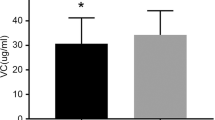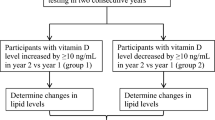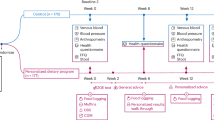Abstract
OBJECTIVE: To investigate whether the changes in lipoproteins following growth hormone (GH) substitution in GH deficient (GHD) adults are determined by the concomitant changes in body composition and physical fitness in a controlled long-term study.
DESIGN: A randomized, double-blind, placebo-controlled trial with GH (2 IU/m2) or placebo given for 12 months.
SUBJECTS: Twenty-seven patients (18 male, 9 female, aged 21–61 y) with adult onset GH deficiency. Comparisons were made with age- and gender-matched healthy adults.
MEASUREMENTS: Serum triglycerides (TG) and lipoproteins, body composition (Dual-Energy X-ray Absorptiometry and computerized tomography), and exercise capacity (V˙O2-max measured by bicycle ergometry) were measured at baseline and after 12 months.
RESULTS: Baseline values of total cholesterol, low-density lipoprotein (LDL) and serum triglycerides were significantly higher in GHD adults compared to normal subjects (P<0.001, P<0.001, P=0.004, respectively) whereas no difference in high-density lipoprotein (HDL) or lipoprotein (a) (Lp(a)) was found. After one year of GH treatment total cholesterol decreased significantly (P=0.02). Serum LDL decreased after GH and increased after placebo, but the difference in delta values was not significant (P=0.12). Serum HDL and TG concentrations were unchanged. Lp(a) increased but not significantly. Serum total and LDL cholesterol remained significantly elevated after one year of GH treatment. Significant reductions in total and visceral adiposity, and improved exercise capacity were also recorded after GH treatment. In normal subjects, serum total cholesterol and TG correlated positively with age, subcutaneous fat and intraabdominal fat, and negatively with V˙O2-max. Serum LDL correlated positively with age. In GHD patients, baseline values of serum TG correlated positively with subcutaneous fat and serum insulin. During treatment, no significant correlations were found between the changes in lipoproteins and in body composition.
CONCLUSION: The cholesterol lowering effect of GH is not determined by the concomitant decrease in adiposity, which supports the concept of a direct effect of GH on lipoprotein metabolism.
This is a preview of subscription content, access via your institution
Access options
Subscribe to this journal
Receive 12 print issues and online access
$259.00 per year
only $21.58 per issue
Buy this article
- Purchase on SpringerLink
- Instant access to full article PDF
Prices may be subject to local taxes which are calculated during checkout
Similar content being viewed by others
Author information
Authors and Affiliations
Rights and permissions
About this article
Cite this article
Vahl, N., Jørgensen, J., Hansen, T. et al. The favourable effects of growth hormone (GH) substitution on hypercholesterolaemia in GH-deficient adults are not associated with concomitant reductions in adiposity. A 12 month placebo-controlled study. Int J Obes 22, 529–536 (1998). https://doi.org/10.1038/sj.ijo.0800618
Received:
Revised:
Accepted:
Published:
Issue date:
DOI: https://doi.org/10.1038/sj.ijo.0800618
Keywords
This article is cited by
-
Early start of growth hormone is associated with positive effects on auxology and metabolism in Prader-Willi-syndrome
Orphanet Journal of Rare Diseases (2020)
-
Effects of low dose versus high dose human growth hormone on body composition and lipids in adults with GH deficiency: a meta-analysis of placebo-controlled randomized trials
Pituitary (2015)
-
Wachstumshormontherapie beim Erwachsenen
Der Internist (2008)



